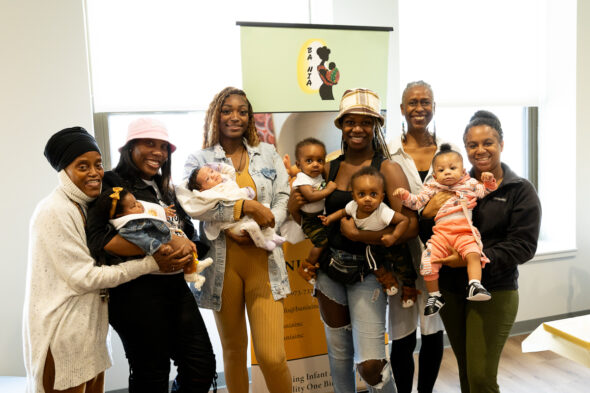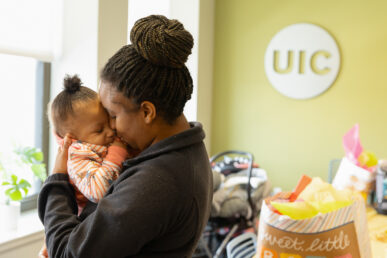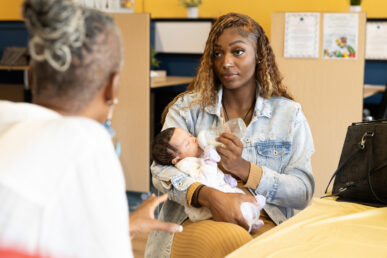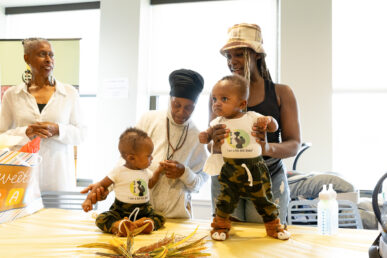UIC Neighborhood Center serves as learning hub for new mothers

At a recent gathering inside the University of Illinois Chicago’s Neighborhood Center in Auburn Gresham, young mothers held their cooing babies tightly in their arms and recounted the day they were born.
In each story, the new moms recalled how they prepared for that momentous day by taking childhood education classes at the center, which opened on the Southwest Side last fall.

An initiative of the UIC Office of Community Collaboration, the center provides pathways to learning and programming in the fields of education, economic development, health and the arts. Participatory research takes place in the center in Auburn Gresham as well as UIC’s neighborhood center in North Lawndale on the West Side, which also opened in 2022, said Keith Lewis, UIC’s senior director of community collaboration.
Other center programming includes health literacy and preventive disease training, STEM programs and academic development offered by community and UIC partners. In addition, the Office of Community Collaboration works with the UIC Office of High School Development and the UIC Department of Black Studies to offer a dual enrollment class to high school students and encourage them to attend UIC.
“We’re really trying to drive engagement and investment from UIC into these two neighborhoods,” Lewis said. “We work in tandem with the community to understand the community’s needs.”
Among the most critical needs were resources for expectant Black mothers, who represent the highest maternal mortality rates in the United States. To reach them, the center invited reproductive justice and healthy equity organization BA NIA Inc. to provide workshops and classes on prenatal and postnatal care for expectant mothers in the community.
One of the participants was Tashiyana Jones, whose daughter, Azarielle, was born in August. She credited the group and UIC’s commitment to the community with helping to make her daughter’s birth a success.
Jones said that when she gave birth, BA NIA’s co-founders, Mekazin Alexander and Aquilla Graves, were birthing assistants.
“It was amazing. I don’t feel like my experience would have been the way it was without them. Honestly, they made it so relaxing,” Jones said. “I’m a first-time mom, and I didn’t have my mom growing up, and I think it’s very important to have women like these ladies helping women around the community.”

BA NIA, which began in the 1990s as a learning circle for Black women, educates expectant mothers throughout their pregnancy about the development of their baby in utero. They continue to advocate for the women during labor, said Alexander, executive director of BA NIA.
“I think it gives them insight and support and the feeling of knowing somebody is there for them,” Alexander said. “It’s an excellent relationship with UIC. We were so grateful that we were asked to be a part of this space and be right in the community.”
Dominique Graham said that before her daughter’s birth last December, she was nervous about becoming a mother. Then, she began taking part in the birth classes and learning various techniques about caring for her daughter, Amiyah, before she was born.
“It helps me a lot; they give me things for my daughter, and they teach me things I don’t know as a first-time mom,” Graham said.
Bryanna Woods said the location is convenient for her because she lives in the neighborhood and brings her 3-month-old daughter, Blessyn, to her doctor at the Mile Square Health Center clinic in the same building. She said the breathing techniques and other skills she learned at BA NIA benefited her greatly when she went into labor.
“It’s a great thing” the center is here, said Woods, adding that from the first moment she walked through the doors, she found a home. “I just felt warm, I felt welcomed, I felt loved, and I felt supported coming here.”

As a mother to twin boys, Samir and Siraj, Faatimat Rufai said she appreciates the assistance she has received and continues to receive at the center. She said when she gave birth in December, Graves was at her side during the delivery.
Even though she had planned a natural birth, when the time came, doctors recommended medication to assist the labor. She was resistant until Graves intervened.
“She talked to the doctor, and then she talked to me and said, ‘This is going to be OK, and you’re going to need this,’” Rufai said.
Rufai said UIC’s presence in the neighborhood is an anchor for young mothers like herself because it serves as a village to provide resources and knowledge they may not know about. She said in addition to having experts like Alexander and Graves impart the knowledge they have learned through their decades as advocates, she and the other mothers are learning from each other.
“It’s a resource for information and to connect with other young mothers because there’s stuff I know that they don’t know, and there’s stuff they know that I don’t know,” Rufai said. “It’s great to have a space for all of us to share.”

